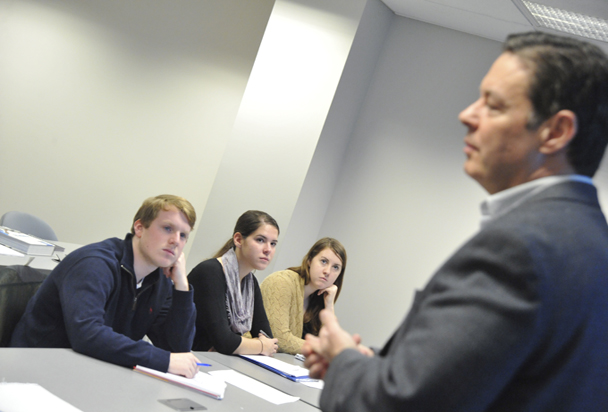Accountancy, MAcc
The Master of Accountancy (MAcc) program is targeted toward recent graduates from bachelors in accounting programs, as well as young professionals working in public accounting firms (within their first three years).
The demand for flexible, high quality accounting education at the master's level is at an all-time high, and is expected to continue growing at a rapid rate. Such growth is fueled by two key market dynamics: (1) most State Boards of Accountancy now require candidates to fulfill 150 credit hours in order to obtain a license (for most CPA candidates who are bachelor's degree holders, this means at least 30 credit hours of extra coursework is necessary), and (2) current hiring by public accounting firms is not only at a record high, but continued growth is projected.
Program Specific Admission Requirements
Given the robust current and projected demand for high-quality flexible masters-level accounting education, students may enter the Master of Accountancy program in the following ways:
- A Master of Accountancy program delivered entirely online or on campus and targeted toward recent graduates from bachelors in accounting programs as well as young professionals working in public accounting firms (within their first three years).
-
Applicants must hold an undergraduate Bachelor's in Accounting degree or hold an undergraduate bachelors degree in business with the completion of satisfactory accounting coursework at the intermediate level as determined by the Accounting Department Chair.
-
Students who have not successfully completed appropriate coursework at the undergraduate level may be admitted and required to successfully complete a series of prerequisite courses as determined by the MAcc Program Director.
-
A minimum overall undergraduate GPA of 3.00 and a minimum GPA of 3.00 in the undergraduate accounting major is normally required for admittance to graduate study.
-
- A five-year, combined bachelor's/master's in accountancy program, with the option to complete the fifth year through campus-based or online courses.
- For a student to be eligible for application to the five-year combined program, he/she must be currently enrolled as an undergraduate accounting major at The University of Scranton. The student may elect to reserve an admission position in the Master of Accountancy program as an incoming freshman. Such position will be reserved as long as the student maintains the GPA requirements of the program.
- The student is formally admitted into the Master of Accountancy program after applying and being accepted as early as their junior year in the Bachelor of Science degree in Accounting from the Kania School of Management at The University of Scranton.
- Once a student is admitted to this combined program, he/she would be permitted to take two graduate courses while still classified as an undergraduate student. If the two courses are “cross-listed” (graduate/undergraduate) courses as indicated below, they may count toward both the Bachelor of Science degree in Accounting and the Master of Accountancy degree:
The program also offers provisional and probationary acceptances. Please note, provisional admission into the MAcc program is currently pending immigration (SEVP) approval for all international applicants. Information on these options can be found in our graduate course catalog.
For general application requirements, please Visit Our Admissions Webpage.
Curriculum
The 30 credit-hour MAcc program takes a real-world and comprehensive approach to develop qualitative, analytical, and soft skills that are immediately applicable to professional accounting roles.
MAcc Program – General Track
Required Graduate Courses (3 credits each):
- ACC 536 - Advanced Managerial Accounting
- ACC 538 - Effective Accounting Communication
- ACC 539 - Accounting Ethics: The Foundation of the Profession
- ACC 540 - Contemporary Financial Accounting Topics
- ACC 550 - Applied Accounting Research (capstone)
Total Required Hours: 15 credits
Elective Graduate Courses (select any 5)
- ECO 507 - Managerial Economics
- FIN 508 - Financial Management
- ACC 514 - Accounting Integration and Configuration
- ACC 525 - International Accounting
- ACC 527 - Financial Reporting and Research
- ACC 531 - Advanced Auditing
- ACC 532 - Advanced Taxation & Regulation
- ACC 541 - Financial Reporting Fraud Detection & Prevention
- ACC 542 - Occupational Fraud & Abuse
- BUAN 571 - Introduction to Business Analytics
- BUAN 572 - Data Mining
- BUAN 573 - Business Analytics Using R
- BUAN 574 - Business Forecasting Models
- BUAN 575 - Business Simulation
- BUAN 576 - Business Database Management
- BUAN 578 - Business Intelligence
Total Elective Hours: 15 credits
Program Total: 30 credits
MAcc Program – Forensic Accounting Concentration
Required Graduate Courses (30 credits; 3 credits each)
- ACC 527 - Financial reporting and Research
- ACC 531 - Advanced Auditing
- ACC 536 - Advanced Managerial Accounting
- ACC 538 - Effective Accounting Communication
- ACC 539 - Accounting Ethics: The Foundation of the Profession
- ACC 540 - Contemporary Financial Accounting Topics
- ACC 541 - Financial Reporting Fraud
- ACC 542 - Occupational Fraud & Abuse
- ACC 550 - Applied Accounting Research (capstone)
- BUAN 571 - Introduction to Business Analytics
Program Total: 30 credits
MAcc Program – Accounting Analytics Concentration
Required Graduate Courses (21 credits total; 3 credits each course)
- ACC 536 - Advanced Managerial Accounting
- ACC 538 - Effective Accounting Communication
- ACC 539 - Accounting Ethics: The Foundation of the Profession
- ACC 540 - Contemporary Financial Accounting Topics
- ACC 550 - Applied Accounting Research (capstone)
- BUAN 571 - Introduction to Business Analytics
- BUAN 572 - Data Mining
Elective Graduate Courses (9 credits total; 3 credits each course; select any 3)
- BUAN 573 - Business Analytics Using R
- BUAN 574 - Business Forecasting Models
- BUAN 575 - Business Simulation
- BUAN 576 - Business Database Management
- BUAN 577 - Business Intelligence
Program Total: 30 credits
For additional information on the curriculum, visit the Loading... Catalog.
What You'll Learn
Business is constantly changing and The University of Scranton is committed to ensuring our students are prepared for the opportunities of tomorrow. We introduce new courses and redesign existing courses to address the current market, as well as employer and student feedback. Strong learning outcomes are guaranteed at The University of Scranton.
This program enables students to meet the 150-hour credit hours required by various states for the CPA exam, while also providing them with the ability to hone their skills in specific areas like financial accounting, auditing, fraud examination and communications. It also provides students with the opportunity to engage in coursework in an online format, thus enabling them to pursue employment opportunities while simultaneously completing the degree.
We’ll prepare you to:
- Hone advanced technical skills demanded in senior level positions
- Be an accounting professional with a high level of integrity and interpersonal skills
- Handle post-SOX regulations and ethical responsibilities
- Leverage accounting knowledge and skills to solve business problems
- Make strategic financial decisions
- Obtain your CPA and other professional certifications
What You'll Learn
Business is constantly changing and The University of Scranton is committed to ensuring our students are prepared for the opportunities of tomorrow. We introduce new courses and redesign existing courses to address the current market, as well as employer and student feedback. Strong learning outcomes are guaranteed at The University of Scranton.
This program enables students to meet the 150-hour credit hours required by various states for the CPA exam, while also providing them with the ability to hone their skills in specific areas like financial accounting, auditing, fraud examination and communications. It also provides students with the opportunity to engage in coursework in an online format, thus enabling them to pursue employment opportunities while simultaneously completing the degree.
We’ll prepare you to:
- Hone advanced technical skills demanded in senior level positions
- Be an accounting professional with a high level of integrity and interpersonal skills
- Handle post-SOX regulations and ethical responsibilities
- Leverage accounting knowledge and skills to solve business problems
- Make strategic financial decisions
- Obtain your CPA and other professional certifications
Inside the Classroom

Learning Goals
Students will gain extensive knowledge in the field and understand how accounting information is generated & disseminated.

Capstone Experience
Immerses the student in research topics that require a mastery of research process & critical thinking skills.

CPA Exam Preparation
Every student has the comprehensive tools and confidence to pass the CPA exam following graduation.

Assistantships
Graduate Assistants, who assist faculty in the delivery of course content, receive a stipend as well as tuition scholarships.
Inside the Classroom

Learning Goals
Students will gain extensive knowledge in the field and understand how accounting information is generated & disseminated.

Capstone Experience
Immerses the student in research topics that require a mastery of research process & critical thinking skills.

CPA Exam Preparation
Every student has the comprehensive tools and confidence to pass the CPA exam following graduation.

Assistantships
Graduate Assistants, who assist faculty in the delivery of course content, receive a stipend as well as tuition scholarships.
University of Scranton MBA / MAcc Degrees
Flexible programming. Jesuit values. Successful outcomes. You’ll find all of this – and more – when you choose the University for your MBA or your Master of Accountancy (MAcc) degree. Our top-notch faculty will work alongside you as you pursue a higher level of education with the AACSB accredited Kania School of Management.
Graduate Education at Scranton
With over 30 programs The University of Scranton can help you to achieve your goals, personally and professionally. Find out what our students have to say about graduate education at Scranton.
University of Scranton MBA / MAcc Degrees
Flexible programming. Jesuit values. Successful outcomes. You’ll find all of this – and more – when you choose the University for your MBA or your Master of Accountancy (MAcc) degree. Our top-notch faculty will work alongside you as you pursue a higher level of education with the AACSB accredited Kania School of Management.
Graduate Education at Scranton
With over 30 programs The University of Scranton can help you to achieve your goals, personally and professionally. Find out what our students have to say about graduate education at Scranton.
Successful Graduates
Job Placement Rate
100%
Companies that have hired recent accounting graduates
Deloitte, EY, Grant Thornton, J.P. Morgan, KPMG, Baker Tilly, PwC, McGrail, Merkel, Quinn & Assoc., SEI Investments
Career Opportunities
Director of Accounting, Tax Director, Director of Financial Reporting, Financial Analyst, Chief Risk Officer, Controller, Internal Auditor, and CFO
Successful Graduates
Job Placement Rate
100%
Companies that have hired recent accounting graduates
Deloitte, EY, Grant Thornton, J.P. Morgan, KPMG, Baker Tilly, PwC, McGrail, Merkel, Quinn & Assoc., SEI Investments
Career Opportunities
Director of Accounting, Tax Director, Director of Financial Reporting, Financial Analyst, Chief Risk Officer, Controller, Internal Auditor, and CFO
Where Will Accountancy Take Me?
- Someone working in accountancy leadership may support a number of job functions including financial advisory services, consulting, growth enterprise, taxes, audits, and more.
- Those working in accountancy leadership roles may work in a variety of professional environments, including the Big Four accounting firms: Deloitte LLP, PwC, EY, and KPMG.
- Graduates may also work for regional and local public accounting firms with a focus on advancing the financial growth of these organizations.
- Our alumni work at all levels in public accounting, public and private companies and government agencies.
- Many of our alumni who serve in senior executive roles provide outstanding career mentoring and internship/job placement opportunities.
Where Will Accountancy Take Me?
- Someone working in accountancy leadership may support a number of job functions including financial advisory services, consulting, growth enterprise, taxes, audits, and more.
- Those working in accountancy leadership roles may work in a variety of professional environments, including the Big Four accounting firms: Deloitte LLP, PwC, EY, and KPMG.
- Graduates may also work for regional and local public accounting firms with a focus on advancing the financial growth of these organizations.
- Our alumni work at all levels in public accounting, public and private companies and government agencies.
- Many of our alumni who serve in senior executive roles provide outstanding career mentoring and internship/job placement opportunities.
Accreditation
The Kania School of Management is fully accredited by AACSB International (Association to Advanced Collegiate Schools of Business). We are the only university in Northeastern Pennsylvania to receive this accreditation. Worldwide, only five percent of business schools are accredited by AACSB.
AACSB accreditation is a seal of approval that reflects the quality of business school. It ensures that the students are learning relevant material; evaluation is done every five years including self-evaluations, peer reviews, committee reviews, faculty qualifications, and curriculum.
Accreditation
The Kania School of Management is fully accredited by AACSB International (Association to Advanced Collegiate Schools of Business). We are the only university in Northeastern Pennsylvania to receive this accreditation. Worldwide, only five percent of business schools are accredited by AACSB.
AACSB accreditation is a seal of approval that reflects the quality of business school. It ensures that the students are learning relevant material; evaluation is done every five years including self-evaluations, peer reviews, committee reviews, faculty qualifications, and curriculum.
Meet the Program Director
Dr. James F. Boyle, DBA, CPA, is an Associate Professor in the Accounting Department at the University of Scranton, where he also serves as the Director of the Master of Accountancy Program and the Faculty Advisor for Accounting Internships. Dr. Boyle is a Certified Public Accountant and has significant professional experience working in public accounting and in internal auditing.

James Boyle, D.B.A., C.P.A.
Graduate Accountancy Program Director Associate Professor of Accounting
D.B.A., Kennesaw State University M.B.A., The University of Scranton B.S., The University of Scranton
(570) 941-6495james.boyle@scranton.edu
Meet the Program Director
Dr. James F. Boyle, DBA, CPA, is an Associate Professor in the Accounting Department at the University of Scranton, where he also serves as the Director of the Master of Accountancy Program and the Faculty Advisor for Accounting Internships. Dr. Boyle is a Certified Public Accountant and has significant professional experience working in public accounting and in internal auditing.

James Boyle, D.B.A., C.P.A.
Graduate Accountancy Program Director Associate Professor of Accounting
D.B.A., Kennesaw State University M.B.A., The University of Scranton B.S., The University of Scranton
(570) 941-6495james.boyle@scranton.edu





